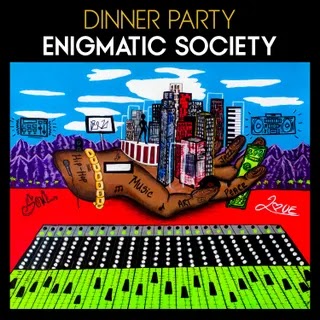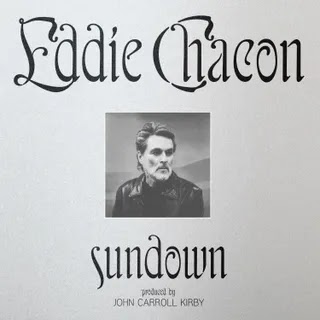Drawing on funk, Afrobeat, and spiritual tradition, two beautifully crafted albums from the elusive UK group passionately consider the entirety of the Black experience in this moment.
Fifty-some years ago, Nina Simone recorded a song for the children. On its face, “To Be Young, Gifted and Black” offers encouragement and hope. Beneath the surface, its somber chords and heavy gait reach for something more complex, unable to ignore the darkness clouding the aspirations of the next generation. In 1969, there were plenty of reasons for a young Black person to feel broken. Within the decade, Martin Luther King Jr., Malcolm X, and four little girls in Birmingham had been killed for being Black. The relentless violence communicated that no one was safe, not the exalted leaders or the purest innocents. Amid so much violence, to carry optimism for the youth was more than just an act of resistance. It was testament to the resilience of Blackness. During a live show at Morehouse College that same year, rocking an Afro, hoop earrings, and a black orchid wrapped around her wrist, Simone improvised the melody and lyrics while the band chugged along: “When you’re feeling depressed, alienated, and real low, there’s a great truth that you should know/To be young, gifted and Black, your soul’s intact, don’t you forget it!”
Untitled (Rise), the second of two beautifully crafted albums released by UK outfit SAULT this year, closes with a song for the children. Like Simone’s work, “Little Boy” holds space for light and dark. A frank warning about the “boys in blue” pivots gracefully to divine affirmations: “Heaven’s angels, shining down on us/They won’t go away, God has chosen us,” before the song ends abruptly, on an unresolved note. 2020 is not 1969, and though “Little Boy” contains more sadness than Simone’s song, it champions that same sense of resilience, one forged in a powerful sense of self and unafraid of struggle. It’s a moving finale to a pair of albums that mirror the external and internal tumult of a year marked by global protests for racial justice. Untitled (Black Is) and Untitled (Rise) are protest music and much more: They are music for the sense of loss that persists when the chants begin to waver and the crowds disperse. They are simultaneously a reprieve and healthy kindling for the fire that rages on in those who don’t have the privilege of turning it off. They are combative, introspective, affirming, and heartbreaking. They are a portrait of Black pain and joy in all its complexities, and in their refusal to flatten Blackness, they are rehabilitative.
While many of this year’s protest anthems have taken cues from hip-hop—think Lil Baby’s “The Bigger Picture” and Pop Smoke’s “Dior”—SAULT’s more obvious inspirations spring from musical styles of the 1970s, blending a rhythmic foundation of funk and Fela Kuti’s Afrobeat with disco, soul, and R&B. Not much is known about the elusive group, who’ve shunned press coverage and declined to volunteer their names. But publications like Variety, the Chicago Reader, and Paste have traced them back to at least two British artists, producer Inflo (who’s worked closely with soul singer Michael Kiwanuka and rapper Little Simz) and R&B singer Cleo Sol, with additional credits listed for Chicago rapper Kid Sister and one Kadeem Clarke. In 2019, the group similarly released two albums, 5 and 7, forays into minimal funk with a political edge that hinted at the work to follow.
Untitled (Black Is) arrived, fittingly, on Juneteenth, just 25 days after the killing of George Floyd. If the timing wasn’t clear enough, the album’s sharp refrains, spoken-word interludes, and deliberate use of repetition make its intentions clear. Echoing the best of Solange’s A Seat at the Table, Black Is is shaped by gorgeous melodies and unequivocal messaging. The haunting shouts of children in “Stop Dem” ring long after the rest of the song has fallen away, a forceful reminder that selective listening is not an option. This call to action is repurposed throughout the album’s first half in several related yet distinct styles along the continuum of Black music, mimicking the chameleonic flair of veteran session musicians. Prominent drum kits and bass guitar exude the warmth and fullness of a live band as the group cycles through the West African bounce of “Don’t Shoot Guns Down” and the soulful whimpers of “Why We Cry Why We Die.” Black Is draws heavily from Black religious traditions, from the spiritual quality of the stunning “Hard Life” to the synthy gospel of “Eternal Life,” which feels like beaming straight up to heaven. On the gentle and contemplative “Sorry Ain’t Enough,” the group turns inwards, confronting the challenges that can arise within a movement: “Can you forgive your people?/They’re just hurting inside/If you look in the mirror/You will see it’s just pride.”
As Black Is shifts through different moods, it never loses focus. “Bow,” featuring Michael Kiwanuka, brings a mid-album injection of vim via Afrobeat-inspired rhythms and soukous guitar licks as it advocates insistently for pan-Africanism and international solidarity. The lo-fi intimacy of “Black,” the closest the album gets to hip-hop, succeeds in finding a perfectly imperfect loop around its titular thesis statement. The swinging oohs of “Miracles” introduce the album’s soft landing, marking a clear distinction from the urgent militancy of the opening. Like a collective exhale, the record’s final moments are loving and calming. At 20 songs, Black Is is ill-suited for short attention spans but therein lies its strength: It passionately considers the entirety of the Black experience in this moment.
Released 13 weeks after Untitled (Black Is), Untitled (Rise) follows a similar structural course with greater production value and attention to detail. Shiny strings undergird a mission statement that doesn’t sacrifice the bite of Black Is but situates itself more firmly in hope. Rise devotes most of its time to dance-driven grooves that flow freely between disco, carnival-esque drum breaks, and polyrhythmic Afrobeat, embracing the motivating power of finding joy in the face of pain. This joy is not escapist; it’s fuel for the ultimate goal of liberation. The uplifting drum break of “Strong,” coupled with the twinkling electric piano of “Fearless,” complement rather than minimize the clarion call to keep fighting for justice. “Street Fighter” presents the directive more bluntly (“We gon’ fight it whether you like it/Keep playing the music loud”), openly challenging the violent history of backlash against Black music. On Rise, hope is often imagined via religious imagery. With its angelic chorus, album standout “Free” weighs the shortcomings of a close relationship against the love of God, while the bright optimism of “Son Shine” uplifts the divine as a protective force.
Rise’s “You Know It Ain’t” expands the spoken-word interludes of Black Is into a full song. While these moments can feel heavy-handed at other times, here the humor is welcome and specific: “I see you over by the water cooler on your break talking ’bout, ‘Tanisha, your mental health is super important to me’/But you know it ain’t!” Both albums’ energy shifts considerably towards the end, but where Black Is aims for comfort, Rise spills over with grief, fear, and uncertainty. The melancholy chords and frank lyrics of “Scary Times” offer the clearest distillation of this tension, and the heart-wrenching instrumental “The Black & Gold” sounds like the sun setting on a life. Their heaviness feels like an acknowledgment of the loss that shadows Black people’s desire for better, a subtle reminder to say their names and never forget them. Like the bittersweet optimism of Nina Simone’s song for the children, SAULT’s work embraces dualities—light and dark, happy and sad, life and death—transforming them from opposing forces into sources of strength.
In an op-ed for NPR this year, jazz trumpeter Terence Blanchard lamented the neutralization of Marvin Gaye’s soulful rebuke of Black death, “What’s Going On.” “It hit me then just how many people listen to the groove and the melody of this song, without really hearing the words,” Blanchard said. “And that made me realize that many well-meaning people have heard only the melody of our plight, without knowing what the song means for us.” SAULT’s albums reinvigorate the musical language of Black protest with a message no less urgent—and a delivery no less commanding—than it was half a century ago. Their whole-hearted commitment to making sound inextricable from meaning reflects the demands of a moment when abolition is gaining more traction with young activists than reform. The fight for Black lives deserves art that mirrors the depth of the crisis and the spirit of the movement. SAULT’s work rises superbly to the task.

















0 comments:
Post a Comment